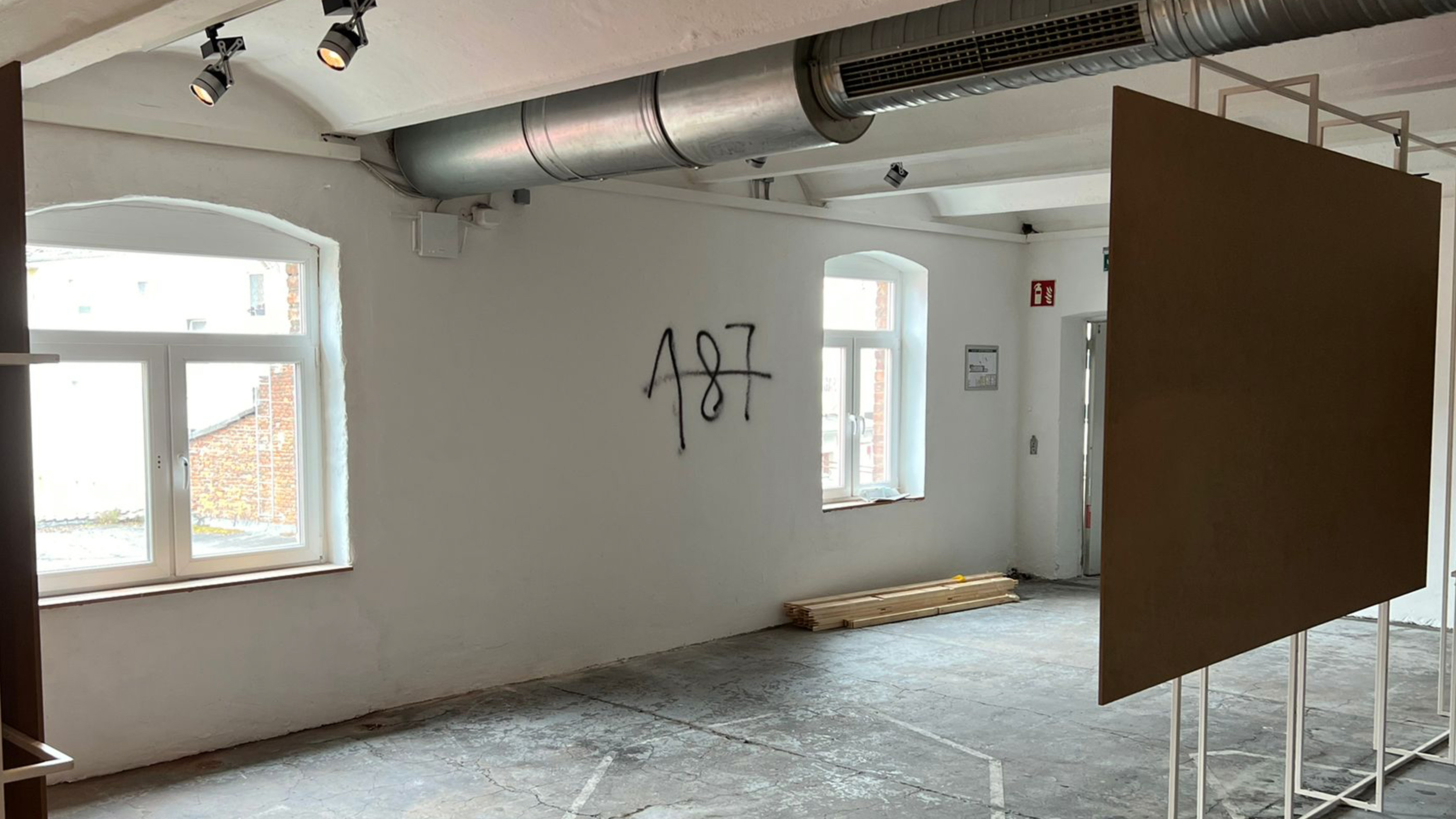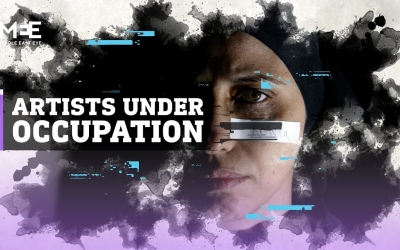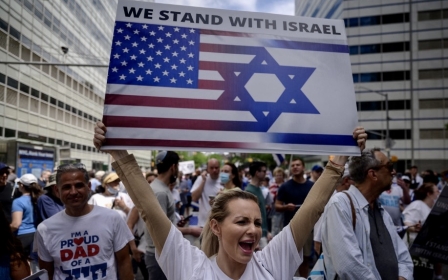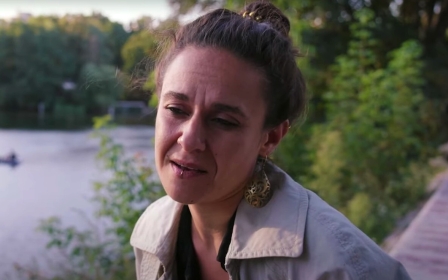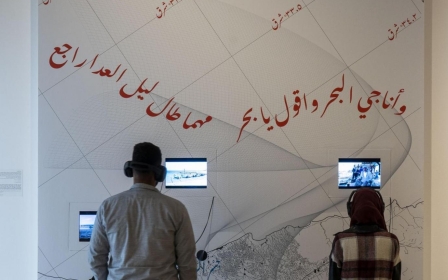Germany: Racist vandalism puts Palestinian artists on edge ahead of Documenta 15 exhibition
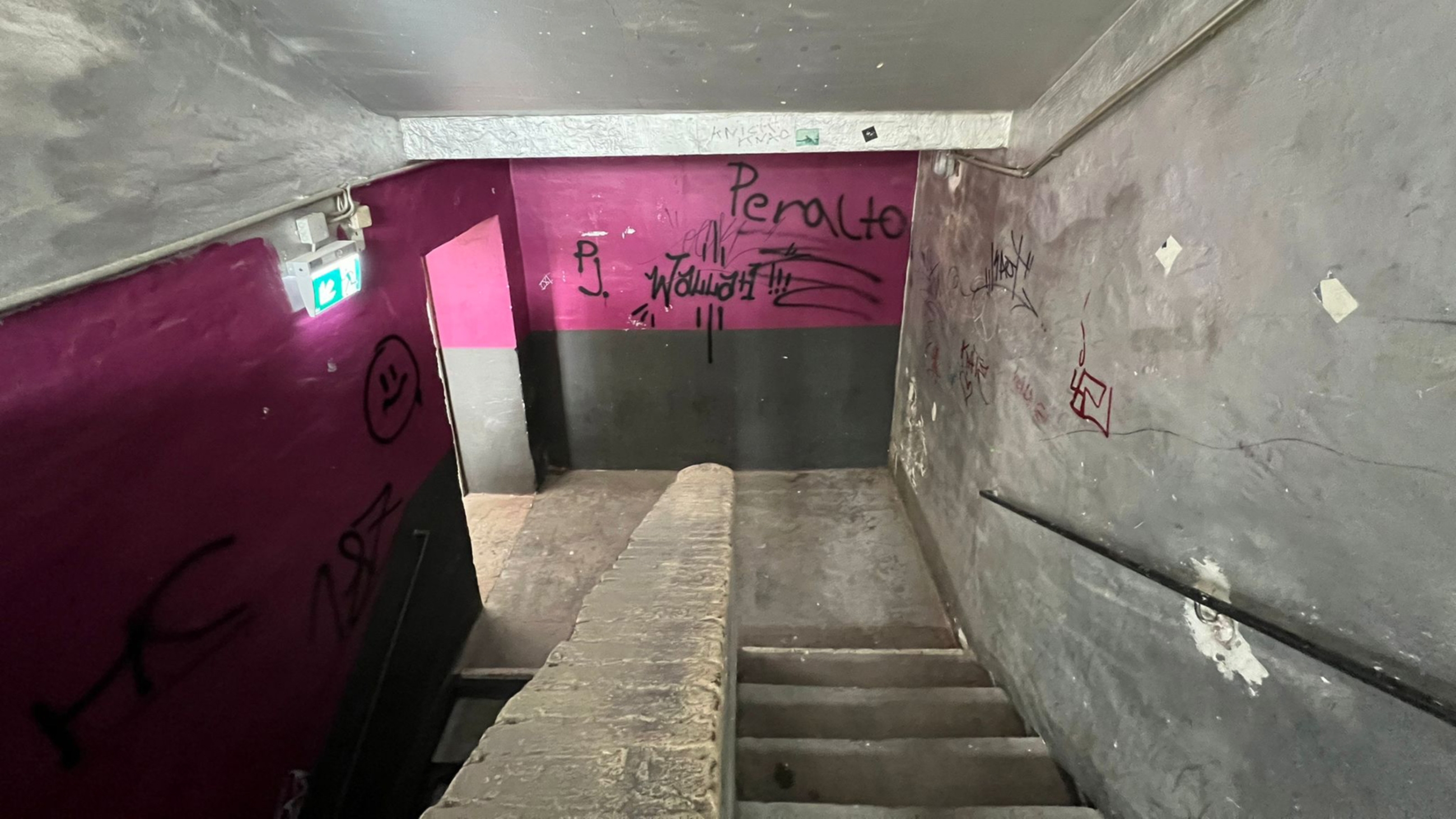
The world’s largest contemporary art exhibition, Documenta 15, will open next week amid political controversy following racist vandalism that targeted a Palestinian exhibition, leaving artists on edge ahead of the highly anticipated event that takes place every five years in the German city of Kassel.
Late last month, unidentified perpetrators broke into the exhibition space of the Palestinian art collective, the Question of Funding, and coated its walls with the substance from a fire extinguisher, and sprayed “187” - a code used in the US as a death threat in reference to the California penal code for a capital offence - and “Peralta” on dozens of surfaces.
Organisers of the event believe “Peralta” alludes to the name of the Spanish fascist politician Isabelle Peralta who was recently denied entry into Germany because of her neo-Nazi views.
“This was a clearly targeted attack as the assailants only vandalised the floors that hosted the Question of Funding,” Palestinian cultural worker and artist Lara Khalidi told Middle East Eye.
“This may have been a death threat and now all the artists are extremely scared to go on with the exhibition.”
New MEE newsletter: Jerusalem Dispatch
Sign up to get the latest insights and analysis on Israel-Palestine, alongside Turkey Unpacked and other MEE newsletters
Khalidi believes that the threat comes after a months-long smear campaign and racist incitement in the German media.
The German group Alliance Against Anti-Semitism Kassel has accused Documenta 15 of involving “anti-Israel activists” and “violating Germany’s strict antisemitism laws” and of supporting the Palestinian Boycott Divestment and Sanctions (BDS) movement.
In Germany, even informal support for BDS can be grounds for repression. In 2019, the Bundestag, Germany’s parliament, passed a resolution categorising the BDS movement as antisemitic.
By restricting them from public funds and public space, the resolution effectively gives state institutions and pro-Israel groups license to attack Palestinian organisations, artists, academics, and individuals.
Germany’s antisemitism commissioner, Felix Klein, has joined in criticism of the exhibition by stating that because “not a single Israeli artist [was] invited, the assumption becomes obvious that Israeli artists should be boycotted".
'Handy label for xenophobia'
Khalidi, along with some of her colleagues were accused of being Nazi sympathisers because they had previously served in leadership positions at the Khalil Sakakini Cultural Center, a prominent arts and cultural nonprofit organisation based in Ramallah, in the occupied West Bank.
The Alliance claimed Khalidi Sakakini, a progressive Palestinian educator, was an antisemite based on false and decontexualised quotations from Wikipedia, while Khalidi and other Palestinian artists have been deemed antisemitic by association.
'This kind of abstruse claim is a convenient cover in the German climate of performative anti-antisemitism to lend an air of legitimacy to attacks on foreigners'
-Michael Sappir, Israeli writer
“This case makes it very clear how 'against antisemitism' has become a handy label for plain xenophobia and racism,” Michael Sappir, a Germany-based Israeli writer, told MEE.
“If the kind of claim used to construct the charge of antisemitism against the artists – particularly the connection with Sakakini – were taken seriously in good faith, a lot of prominent Germans affiliated to organisations with a Nazi connection would be implicated much more seriously.
“But this kind of abstruse claim is just a convenient cover in the German climate of performative anti-antisemitism to lend an air of legitimacy and high-mindedness to attacks on foreigners, and of course Palestinians in particular."
The Khalil Sakakini Cultural Centre said in a statement that “worn-out” antisemitism allegations are increasingly being used in Germany against those who speak up against Israel’s occupation and oppression against Palestinians.
“A charge used as a tool to silence critics and as a tool of intimidation. This persistent attack had mushroomed from a media incitement into a direct attack,” it said.
Cultural theorist Sami Khatib said the "systematic" anti-Palestinian racism in Germany is masked as a humanitarian endeavour.
“It follows from the world community’s self-perceived role as saviour and rescuer to avoid ‘past evil’ in the present and future,” Khatib said.
Defining antisemitism
Even the opportunity to seek a proper definition of antisemitism and discuss the accusations openly by the organisers has come under scrutiny.
The cancellation of a panel organised by Documenta to address issues related to anti-Semitism, racism, and Islamophobia, reportedly followed a letter by Josef Schuster, president of the Central Council of Jews in Germany, sent to Claudia Roth, Germany’s state minister for culture and media.
Schuster criticised the “clear bias” at Documenta, suggesting the panel was one sided and did not contain pro-Israeli speakers. The letter stressed the need for “clear avowals and resolute political action at every level of politics, art, culture, and society” to combat antisemitism.
The panel, as a result of self-censorship by participants in light of the recent backlash, was cancelled.
“The institute thought it was best to organise a public debate about what antisemitism means. Instead, we were accused of being one-sided even though the panel consisted of Israeli participants,” Khalidi said.
Meanwhile, Ruangrupa, the Indonesian artists' collective curating Documenta 15, responded to the antisemitism accusations in an open letter.
“When any criticism of Israeli state action is routinely demonised and equated with antisemitism, one can only expect that demonisation to be challenged. This challenge comes primarily from those who are affected by the Israeli state's human rights violations,” the letter reads.
“The German culture of equating anti-Zionism and even non-Zionism with antisemitism excludes, smears, and silences Palestinians and non-Zionist Jews from the fight against antisemitism by declaring them to be themselves antisemites.”
The most troubling detail, however, is the origins of the antisemitism rumours.
Artists and activists have pointed out that the Alliance Against Antisemitism Kassel, where all of these rumours and accusations originated from, is in fact nothing but a blog run by a single individual associated with a far-left splinter group called the Antideutsche movement.
The activists believe that major German news outlets had picked up the information published by the blog without fact-checking the claims, which, they say, are riddled with inaccurate and racist tropes.
“What is most apalling”, Khalidi said, “is that these baseless accusations were picked up by serious national German media outlets, which repeated the calls that Documenta needed to be cancelled if antisemitism there wasn’t countered.
“The media have ignored that this is a one-man show by an individual who regularly posts flagrantly Islamophobic and racist content on Facebook. Instead, they pick up his fabricated, meditative, and even fictional accounts as facts,” Khalidi added.
On Edge
Now, only one week away from the anticipated art exhibition, which will run from 18 June to 25 September, artists and organisers are on edge.
While Documenta has responded to the vandalism and threats by filing a police report and ramping up security at its venues, many believe that its response and official statement were not enough.
While the community of artists released their own statement describing the vandalism as a racist attack, the press release by Documenta simply stated that it was a “politically motivated” threat, without mentioning that the target was Palestinian artists, nor describing the act as a hate crime.
MEE sent an inquiry to Documenta’s press contact about its choice of words, but received no response.
'What is most apalling is that these baseless accusations were picked up by serious national German media outlets'
-Lara Khalidi, Palestinian artist
“The problem with most responses to the Documenta 15 racist attacks, however well-meaning they tended to be, is that they are partaking in obfuscation,” Edwin Nasr, an Amsterdam-based cultural worker, and writer, told MEE.
“As a matter of fact, they aren’t even able to call [the attack] what they are to begin with."
Firas Shehadeh, a Palestinian artist based in Vienna, told MEE that Documenta’s attempt to present the attack as an isolated incident “distracts from the fact that this is a racist assault".
Shehadeh said Documenta only issued its statement following the pressure that Palestinian and international solidarity had exerted.
Still, he added, the statement only repeated the anti-Palestinian rhetoric. “They did not even mention the victim — Palestine or Palestinians," Shehadeh said.
"Instead, the statement came to cover up their failure to protect artists invited that only wanted to contribute to the international contemporary art discourse.”
Documenta is a publicly funded institute, which, according to Khalidi, makes it subject to self-censorship, restricting its ability to be vocal on the issue for fear of being stripped of its funding.
“There is no doubt, however, that if it was any other group, this would definitely be called a hate crime,” she said.
“To ensure the safety of Palestinian and pro-Palestinian artists and activists, we do not only need security and more police, but a strong and clear position that calls this what it is: anti-Palestinian racism.”
This article is available in French on Middle East Eye French edition.
Middle East Eye delivers independent and unrivalled coverage and analysis of the Middle East, North Africa and beyond. To learn more about republishing this content and the associated fees, please fill out this form. More about MEE can be found here.


